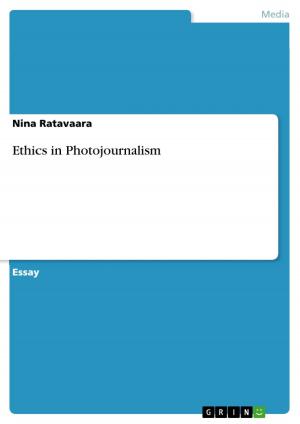Social Criticism in Oscar Wilde's Lady Windermere's Fan
Fiction & Literature, Literary Theory & Criticism, British| Author: | Christina König | ISBN: | 9783638228978 |
| Publisher: | GRIN Verlag | Publication: | November 12, 2003 |
| Imprint: | GRIN Verlag | Language: | English |
| Author: | Christina König |
| ISBN: | 9783638228978 |
| Publisher: | GRIN Verlag |
| Publication: | November 12, 2003 |
| Imprint: | GRIN Verlag |
| Language: | English |
Seminar paper from the year 2003 in the subject English Language and Literature Studies - Literature, grade: 2 (B), University of Tubingen (English Philology), course: Proseminar I: Introduction to Drama, 4 entries in the bibliography, language: English, abstract: Today almost everything is accepted in modern society. It does not matter if a person is homosexual, bisexual or transsexual. Further, everyone can do even almost everything that pleases him. So, a lot of men 'try' women -the more, the more they are famous, rich or successful. And even today's women have broken free from their traditional tasks: raising a family, staying at home and doing the cooking. Instead, it is fashion to live a man's life: going to parties, having a lot of affairs and neglecting the morals. Today's women are as bad as their masculine fellow men. And even they have become worse- if you want to believe in what the older generation says about our youth. Maybe, this is true. If you compare it to the Victorian Age, so much seems to have changed. Thinking of Oscar Wilde, you will soon realise that he could have lived a much easier life in today's world. He was an 'enfant terrible' of his time. Not only that his artistic and theatrical views did not fit into society at all, but it were especially his sexual preferences that caused his main problems. In contrast to the latest tendency of acceptance for homosexuality, it was a real crime about the year 1900 and so he had to spend a certain time in prison. 'The double life that it entailed was by no means a simple matter of deceit and guilt for Wilde: it suited the cultivation of moral independence and detachment from society that he considered essential to art.' 1(Small:1999,xiv/xv). With his behaviour he offended the leaders, institutions and press of his Philistine country. Yet, he always tried to be accepted by Society, but his attempts were mostly answered with exclusion.As Wilde lived for art, his works are a mirror of his own disappointment and frustration about the contemporary value system. So it is certainly very interesting to examine his play Lady Windermere's Fan in regard to social and moral views. 1 Ian Small, 'Introduction,' Ian Small (ed.), Lady Windermere's Fan. A Play About a Good Woman (London: New Mermaids,1999) xiv/xv.
Seminar paper from the year 2003 in the subject English Language and Literature Studies - Literature, grade: 2 (B), University of Tubingen (English Philology), course: Proseminar I: Introduction to Drama, 4 entries in the bibliography, language: English, abstract: Today almost everything is accepted in modern society. It does not matter if a person is homosexual, bisexual or transsexual. Further, everyone can do even almost everything that pleases him. So, a lot of men 'try' women -the more, the more they are famous, rich or successful. And even today's women have broken free from their traditional tasks: raising a family, staying at home and doing the cooking. Instead, it is fashion to live a man's life: going to parties, having a lot of affairs and neglecting the morals. Today's women are as bad as their masculine fellow men. And even they have become worse- if you want to believe in what the older generation says about our youth. Maybe, this is true. If you compare it to the Victorian Age, so much seems to have changed. Thinking of Oscar Wilde, you will soon realise that he could have lived a much easier life in today's world. He was an 'enfant terrible' of his time. Not only that his artistic and theatrical views did not fit into society at all, but it were especially his sexual preferences that caused his main problems. In contrast to the latest tendency of acceptance for homosexuality, it was a real crime about the year 1900 and so he had to spend a certain time in prison. 'The double life that it entailed was by no means a simple matter of deceit and guilt for Wilde: it suited the cultivation of moral independence and detachment from society that he considered essential to art.' 1(Small:1999,xiv/xv). With his behaviour he offended the leaders, institutions and press of his Philistine country. Yet, he always tried to be accepted by Society, but his attempts were mostly answered with exclusion.As Wilde lived for art, his works are a mirror of his own disappointment and frustration about the contemporary value system. So it is certainly very interesting to examine his play Lady Windermere's Fan in regard to social and moral views. 1 Ian Small, 'Introduction,' Ian Small (ed.), Lady Windermere's Fan. A Play About a Good Woman (London: New Mermaids,1999) xiv/xv.















